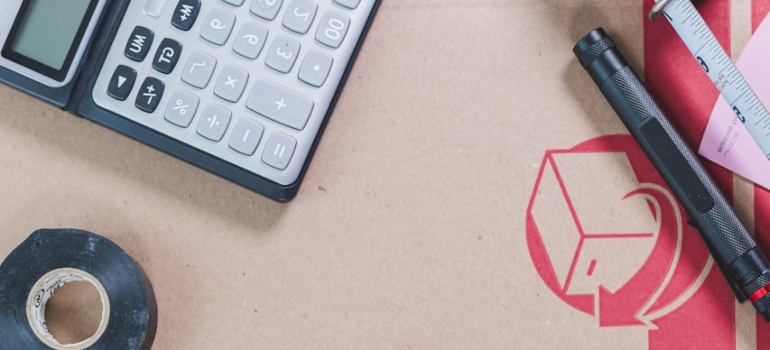How to Calculate Expenses When Moving Out
For years, the conventional wisdom on moving out has been: prepare for financial pain. Hidden costs, skyrocketing expenses – it’s a recipe for budget disaster, or so we’ve been told. But what if there’s a different story? What if you can calculate expenses when moving out and do not feel like you’ve just run a marathon in ill-fitting shoes? Our longtime movers in the Boise area have helped countless families transition to their new homes smoothly. We’ve also seen firsthand the myths and misconceptions surrounding moving-out costs, and we’re here to debunk them.
Essential Costs to Consider for Your Move
Moving out is a chance to spread your wings and create a new space for yourself. But amidst the flurry of packing and planning, the financial realities of the move can easily hide in the shuffle. Unforeseen expenses are lurking around every corner, like rogue packing peanuts. To avoid this unpleasant surprise, let’s unpack the essential costs you need to consider when calculating your moving-out expenses:
- Mortgage Expenses: If buying a new home, factor in mortgage payments, potential down payment, and closing costs.
- Homeowner’s or renter’s insurance: Determine if your existing coverage applies or if you need a new policy.
- Hiring professional movers: Costs of moving services Boise ID can vary depending on distance, services included, and hourly rates.
- Truck rental (DIY move): Consider truck size, rental duration, mileage fees, and insurance.
- Parking permits: For your new residence and potentially temporary permits during the move.
- Security deposit: Typically equivalent to one month’s rent.
- Travel and temporary accommodation: Costs associated with traveling to your new location and potentially staying in temporary housing.
- Utilities: To calculate expenses when moving out properly, research electricity, water, gas, and trash collection rates in your new location.
- Babysitting: If you require childcare during the moving process, include these costs.
- Pet deposits and pet-related expenses: These are applicable if you have pets and your new place requires deposits or has pet restrictions.
- Internet and cable installation fees: Including potential connection and equipment rental costs.
- Subscription service adjustments: Review and update subscriptions to avoid unnecessary charges.
- Change-of-address fees: These are incurred when notifying the DMV, credit card companies, banks, and subscription services.
- Temporary storage: You may need it for furniture or belongings while transitioning between residences.
- Disposal fees: For unwanted furniture or large items that cannot be donated or sold.
- Packing supplies: Boxes, tape, bubble wrap, packing peanuts, and furniture covers.
- Furniture disassembly/reassembly: Especially for complex pieces or tight spaces.
- Food and supplies: Budget for meals during the move and essential supplies for your new home.
- Cleaning supplies: For cleaning your old and new residences.
- Unexpected repairs or last-minute needs: Set aside a contingency fund for unforeseen circumstances.
There you have it! A comprehensive list of potential moving-out expenses will help you start. Now, let’s look deeper into each category to equip you with the knowledge and tools you need to create a realistic moving budget.

Mortgage expenses
If you’re buying a new home, be prepared for several ongoing expenses associated with your mortgage. Your mortgage payment will be your largest monthly housing cost. Utilize online mortgage calculators to estimate monthly payments based on the loan amount, interest rate, and loan term.
The down payment you make upfront can significantly impact your monthly mortgage payment and loan terms. While the minimum down payment is typically 3.5%, a 20% down payment eliminates private mortgage insurance (PMI), a monthly fee for loans with less than 20% down. Don’t forget about closing costs, which can range from 2% to 5% of the purchase price. These include origination fees, appraisal fees, title insurance, and attorney fees. Researching average closing costs in your area will help you factor them into your moving budget.
Moving Expenses
Hiring professional long distance movers in Boise can be a lifesaver, especially for long-haul moves or if you have a large amount of furniture. The cost depends on several factors. The further you move, the more movers will charge. Packing and unpacking services can add a significant chunk to the bill, so consider if these are essential for your needs. Special handling of delicate items like pianos or antiques will incur additional fees on top of the base service rate.
Obtaining quotes from multiple moving companies is crucial. National movers might have a standard rate structure, while local movers may offer hourly rates. These rates can range from $50 to $150 per mover, with additional charges for travel time and labor. Schedule in-home estimates for movers to assess your belongings to get the most accurate quote possible. Don’t forget to inquire about potential discounts for seniors, AAA members, or military personnel.
DIY Move Expenses
If you’re tackling the move yourself with a rental truck, consider these costs. Choosing the right size truck is crucial to ensure all your belongings fit comfortably. A small pickup truck might cost around $100 per day, while a large moving truck can range from $200 to $400 per day. Factor in loading time, travel time to your new location, and unloading time when determining the rental duration. Some companies offer discounts for extended rentals (multi-day rentals can be cheaper than single-day rentals).
Be mindful of per-mile charges, which typically range from $0.20 to $0.30 per mile. Planning your route efficiently can help minimize mileage costs. Rental truck insurance is highly recommended, typically costing around $15 to $30 per day, to protect yourself from any damage incurred during the move. In addition to the truck rental, you’ll also need to factor in gas, tolls, and any potential repairs or breakdowns that might occur during your move.
Security Deposit
The security deposit, typically equivalent to one month’s rent (usually $500-$2,000 depending on location and rental price), is collected by your landlord to serve as a safety net against any damage to the property beyond normal wear and tear. At the lease end, you’ll get the deposit back minus any deductions for repairs necessitated by your tenancy.

Travel Costs
As you calculate expenses when moving out, don’t forget that traveling to your new location involves gas, tolls, plane tickets, or car rentals. The cost will vary depending on the distance and the mode of transportation you choose. If necessary, factor in the cost of staying in temporary housing, like a hotel or Airbnb, until your new place is ready. The cost can vary depending on location and season but expect to pay anywhere from $50 to $200 per night.
Homeowner’s/Renter’s Insurance
Review your existing homeowner’s or renter’s insurance policy to see if it covers your new residence. If your move takes you outside your current policy’s coverage area, you’ll need to obtain quotes for a new policy at your new location. Costs can vary depending on the value of your belongings, your deductible amount, and the specific coverage options you choose. Expect quotes to typically range between $100 and $300 per year, with higher coverage amounts or lower deductibles leading to higher premiums.
Parking Permits
Factor in the cost of parking permits for your new residence. Annual permits typically range from $20 to $200 depending on your location and the type of permit (street parking vs. resident permit for a specific lot). You might also need temporary permits during the moving process, depending on local regulations. These temporary permits can range from a daily rate of $5-$10 to weekly permits of $20-$50.
Utilities
Research utility rates (electricity, water, gas, trash collection) in your new location to avoid surprises in your first bill. Setting up utilities at your new residence typically involves connection fees, which can vary depending on the provider but generally range from $25 to $100 per service. You might also need to establish a security deposit, especially if you have no prior service history with the utility company. These deposits can be equivalent to your estimated monthly bill or a set amount, depending on the provider’s policy.
Childcare
If you require childcare assistance during the packing or moving process, factor in these costs. Depending on your location, the age of your children, and the type of care needed (nanny, daycare center), costs can vary significantly. Expect childcare rates to range from $10 to $25 per hour.
Pet Deposits and Pet-Related Expenses
If you have pets, research pet deposit requirements and any pet restrictions at your new residence. Pet deposits are typically refundable fees charged by landlords, often equivalent to one month’s rent, to cover potential pet-related damages. Some residences may have monthly pet fees on top of rent. Factor in any additional pet-related expenses you might incur during the move, such as pet boarding or transportation costs.
Internet and Cable Installation Fees
Contact your internet service provider (ISP) and cable company well in advance of your move to inquire about transferring or establishing service at your new location. Factor in potential connection fees, typically ranging from $25 to $100 per service. Equipment rental costs can add another $10 to $30 per month, depending on the equipment needed. Early termination charges from your current providers may also apply, so factor those in if you’re breaking your contract early.
Subscription Service Adjustments
Take advantage of the move to assess and potentially adjust your recurring subscriptions. Review services like streaming platforms, gym memberships, or online publications to avoid paying for unused services in your new location. Cancellation fees may apply depending on the service provider’s policy.

Change-of-Address Fees
Notify the DMV, credit card companies, banks, and subscription services of your change of address to ensure smooth service transitions. There may be small fees associated with change-of-address notifications for certain entities, typically ranging from $1 to $10 per service. A missing dollar fee here or there might seem insignificant, but it all adds up. So, when you calculate expenses when moving out, include even those small costs.
Temporary Storage
Consider temporary storage if needed to bridge the gap between residences. This can be helpful if your new place isn’t move-in ready or you need to declutter before selling your current home. Costs typically depend on the storage unit size and rental duration, with prices ranging from $50 to $200 per month for a small unit.
Disposal Fees
If you have unwanted furniture or large items that cannot be donated or sold, factor in disposal fees for proper junk removal. Haul-away services typically charge by the truckload, with prices ranging from $100 to $400 depending on the amount of junk you need removing. You can potentially save money by dropping off unwanted items yourself at a local landfill or recycling center, but associated fees and restrictions may apply.
Packing Supplies
Budget for essential packing materials like moving boxes Boise offers (varying sizes), packing tape, bubble wrap, packing peanuts, and furniture covers to ensure your belongings are protected during the move. As you estimate and calculate expenses when moving out, note that costs can vary depending on the quantity and quality of packing supplies you need. Expect to spend anywhere from $50 to $200 on essential packing materials.
Furniture Disassembly/Reassembly
Consider the cost of disassembling and reassembling complex furniture, especially for tight spaces in your new residence. Depending on the complexity, hiring professional furniture disassembly and reassembly can range from $50 to $150 per piece of furniture.
Food and Supplies
Budget for meals during the moving process, including takeout or groceries, to keep yourself and any helpers fueled. Stock up on essential supplies for your new home, such as toilet paper, paper towels, and cleaning products. This can cost anywhere from $50 to $200, depending on your needs and how well-stocked you already are.
Cleaning Supplies
Allocate funds for cleaning supplies to ensure both your old and new residences are clean and ready for the next chapter. Basic cleaning supplies like multi-purpose cleaners, disinfectant wipes, sponges, and trash bags can cost around $50.

Stay Organized, Save Money
Feeling overwhelmed by potential moving costs? Take a deep breath! Here’s a streamlined approach to take control. First, gather intel. Explore online resources and utility companies in your new location to understand ballpark figures for permits, insurance, and utilities.
Next, leverage technology for budgeting. Spreadsheets or budgeting apps become your allies. Create a moving budget with categories like permits, insurance, and packing supplies. Allot realistic amounts based on your research and move specifics (distance, home size).
Finally, prepare for the unexpected. Allocate a 10% buffer in your total budget for unforeseen costs. Consider using receipt management apps to calculate expenses when moving out, stay organized, and simplify expense tracking. Remember, clear communication is key when obtaining moving quotes! Explain the scope of your move (distance, belongings) to ensure accurate estimates. Don’t hesitate to compare quotes and negotiate rates, especially if you’re flexible with scheduling.

